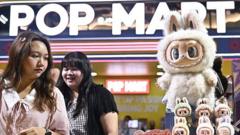In an exciting forecast, Pop Mart, the renowned Chinese toy company behind the immensely popular Labubu dolls, announced that it expects its profits for the first half of the year to leap by at least 350%. The Beijing-based firm revealed that its revenues have more than tripled, pushing it to an impressive market value exceeding $40 billion (£31.6 billion).
The contagious charm of the Labubu dolls—fictional elf-like figures characterized by their striking jagged teeth—has led to frenzied demand globally, with dedicated collectors finding themselves in endless lines outside shops. The company credits its profitability surge partly to heightened brand recognition worldwide and stringent cost controls.
Known for innovative marketing techniques that include "blind boxes," where toy contents remain a mystery until opened, Pop Mart has faced mixed reactions. Critics argue this approach encourages gambling-like behaviors and compulsive buying among consumers. Since their launch in 2019, Labubu dolls have facilitated Pop Mart's rise, with the company now boasting over 2,000 vending machines and storefronts globally.
Having debuted on the Hong Kong Stock Exchange in 2020, Pop Mart's stock has skyrocketed almost 600% over the past year. Notably, sales from outside mainland China contributed nearly 40% to its total revenue in 2024, highlighting Labubu's breakout success—especially in the U.S.—where celebrity endorsements from stars like Kim Kardashian and Lisa from K-pop group Blackpink have catapulted visibility.
Equity research firm M Science reported that Labubu's U.S. sales surged by a staggering 5,000% in June compared to the previous year. "I haven't witnessed anything like this from other toy manufacturers," remarked M Science senior analyst Vinci Zhang. The company sees significant potential for growth in the U.S., where it operates about 40 shops compared to around 400 in China.
The insatiable demand has also given rise to a flourishing resale market; while Labubu dolls retail for approximately $10, some can fetch extraordinary prices, with a human-sized version selling for an astounding $150,000 at auction in Beijing.
However, this popularity comes with challenges, including a surge in counterfeits, colloquially called Lafufu dolls. In June alone, authorities in China seized over 46,000 counterfeit Labubu toys, bolstering efforts to suppress an expanding black market for these coveted collectibles.





















